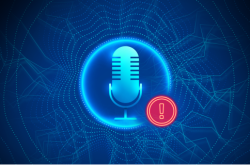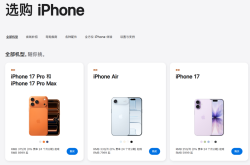Apple Intelligence launches! Overseas netizens crazy about complaints: GPT shell is too obvious
![]() 10/30 2024
10/30 2024
![]() 476
476

Finally, the core competitiveness of the iPhone 16 series, Apple Intelligence, has been launched!
Apple AI in the Chinese market won't be available until April 2025, but this isn't necessarily a bad thing for domestic consumers. We can decide whether to purchase the iPhone 16 series or iPhone 15 Pro/15 Pro Max for Apple Intelligence based on feedback from the first batch of users.
After the launch of Apple Intelligence, the first batch of feedback has been released. If you're interested in this feature and considering purchasing the iPhone 16 series for its AI capabilities, let's take a look at how overseas iPhone users have evaluated Apple Intelligence with Lei Technology. Obviously, this is more valuable than reviews from some "Apple-friendly" media.
ChatGPT shell? Apple Intelligence disappoints netizens
On overseas social platform X, most tweets merely repeat the news of Apple Intelligence's launch like a parrot. After carefully sifting through countless tweets, I found that almost none of the users who have experienced Apple Intelligence gave it a positive review.
One netizen bluntly stated that they couldn't find anything that Apple Intelligence could compute on the device-side or cloud-side large models. All their requests were redirected to GPT chat.
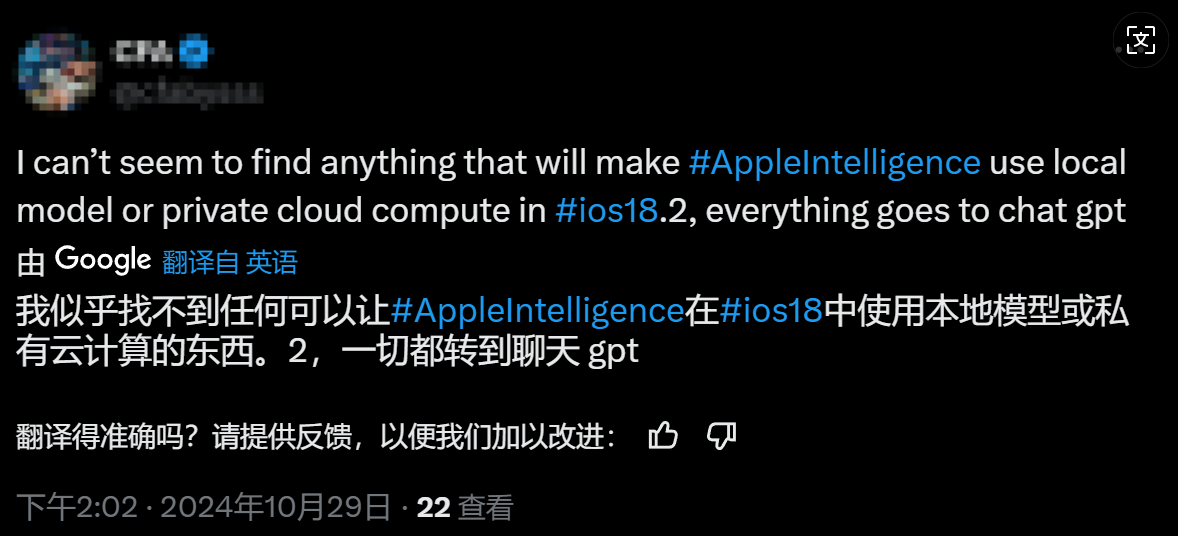
(Image source: X screenshot)
Another netizen echoed the sentiment, saying that after Siri changed its name to Apple Intelligence, its function became merely a medium. When users ask it questions, it turns around and asks ChatGPT. Siri isn't smart, and ChatGPT isn't particularly stable. With these double debuffs, Siri becomes even more unreliable, making it better to just ask ChatGPT directly.

(Image source: X screenshot)
A tech blogger wrote a long article denouncing Apple, stating that Apple has always marketed itself with an exclusive brand image, giving people the impression of redefining a category. This situation leads other companies to potentially make up for their technical deficiencies with third-party tools, but people have higher expectations of Apple. It's one thing if Apple AI arrives late and isn't user-friendly, but if it integrates with ChatGPT and Apple Intelligence merely becomes a shell for ChatGPT, only providing a prettier user interface, that's another matter entirely. Apple's actions are undoubtedly ironic for a brand that prides itself on being "different." (PS: This evaluation is entirely based on the netizen's comments and does not represent my personal opinion.)
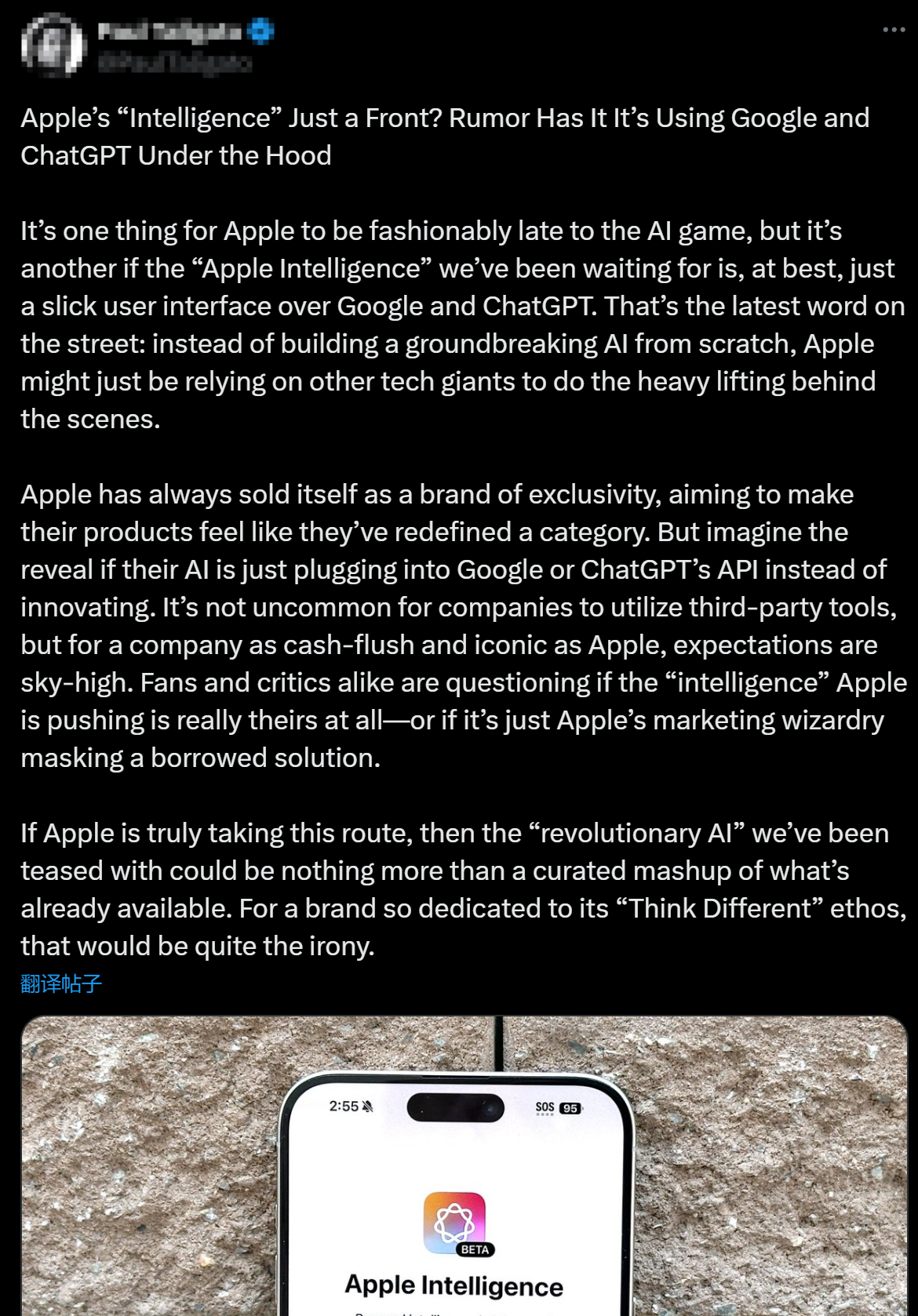
(Image source: X screenshot)
Earlier, Bloomberg reporter Mark Gurman reported that an Apple insider revealed that Apple's AI technology lags behind competitors by at least two years. In a recent interview, Apple CEO Tim Cook addressed this topic, stating that Apple wasn't the first to develop AI technology and is doing so in a way that best suits customers, focusing more on user experience than competing to be an industry leader.
While Cook's statement is true, it gives off a sense of insecurity when applied to Apple. Apple wasn't the first smartphone manufacturer or TWS earphone maker, but the iPhone ushered in the smartphone era for the mobile phone industry, and AirPods led the Bluetooth industry into the TWS era. Cook's admission that Apple lags behind in AI technology could impact Apple's image to some extent.
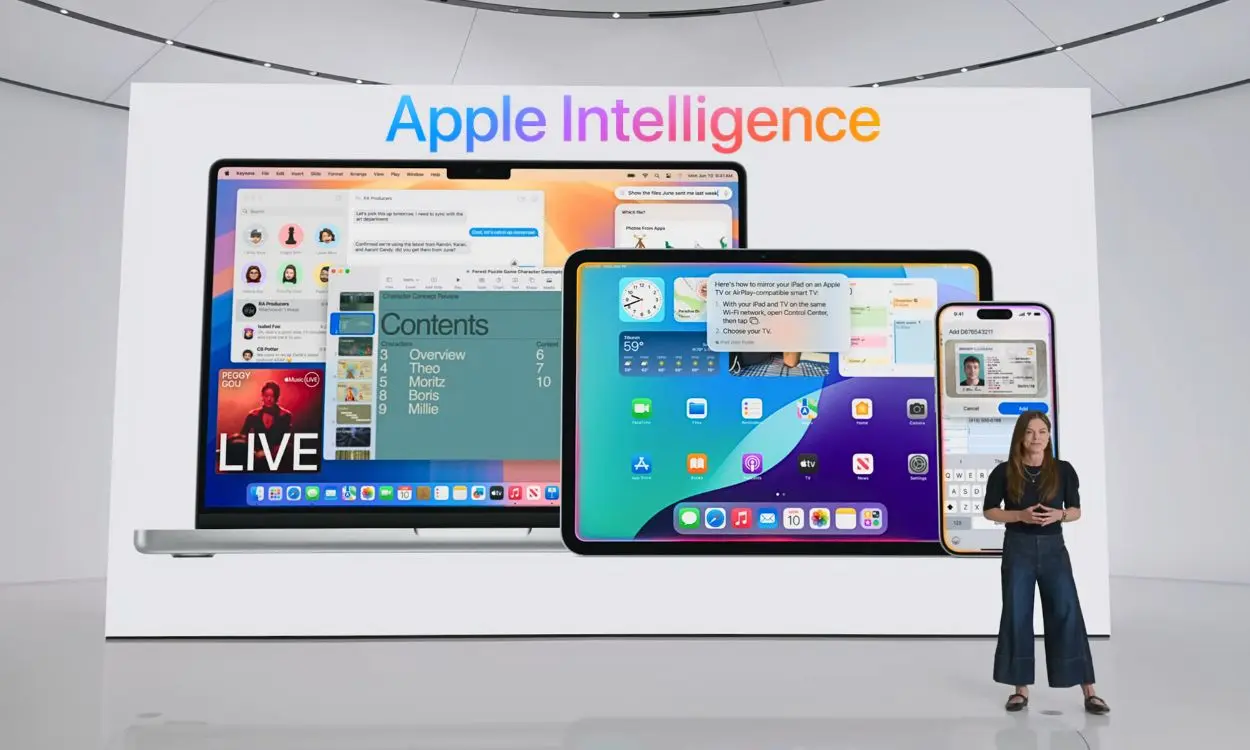
(Image source: Apple)
Furthermore, as one of OpenAI's investors and with deep collaboration, some netizens bluntly believe that Apple Intelligence is merely a ChatGPT shell. Apple devices actually equip the 3 billion-parameter device-side large model Apple On-Device and the cloud-side large model Apple Server.
Apple's official data shows that Apple Server is slightly inferior to GPT-4 Turbo overall but excels in summarization, mathematical reasoning, coding, classification tests, security, and other aspects.
Besides complaining about Siri still being unusable, many netizens also lament that iPhone 15/15 Plus and older models can't use Apple Intelligence, while the lower-end iPhone SE 4 is likely to support Apple AI capabilities.
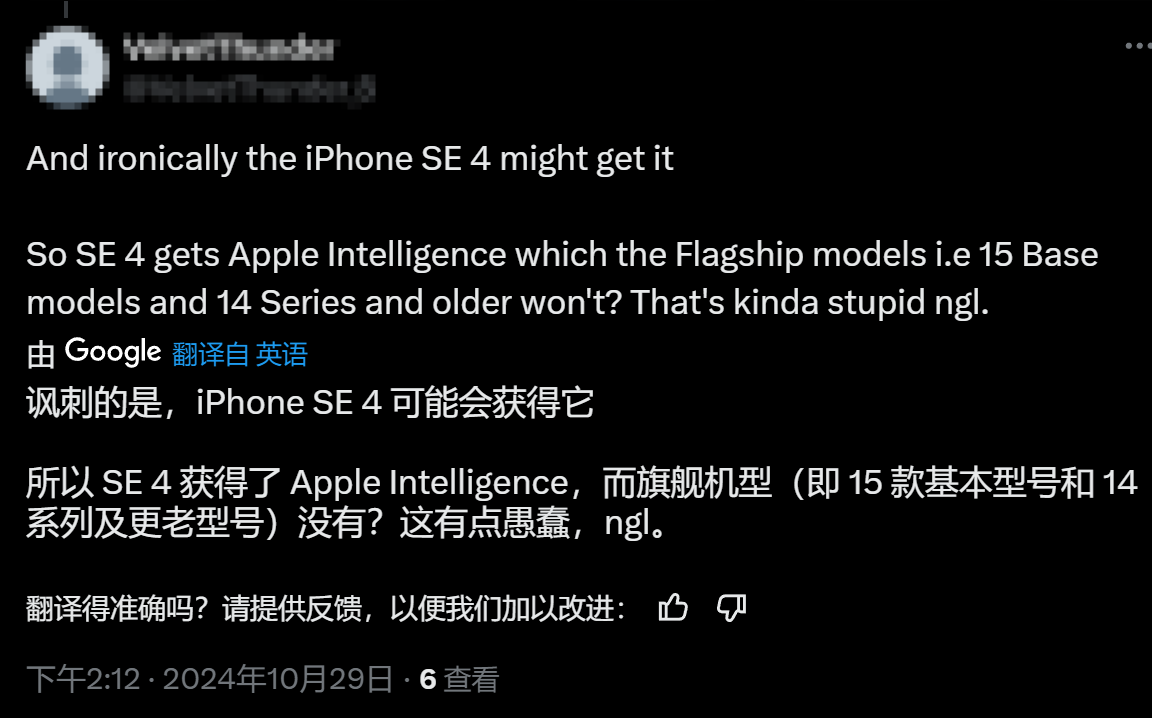
(Image source: X screenshot)
One netizen even compared Tesla's promise to replace users' hardware for free if the HW3.0 platform fails to achieve true autonomous driving with Apple's actions. I understand the sentiment behind these netizens' behavior. Apple's long-term system update maintenance service for its devices has always been a product highlight and testament to its reliability. However, last year's iPhone 15/15 Plus can't use Apple Intelligence, leaving abandoned users feeling Unwilling .
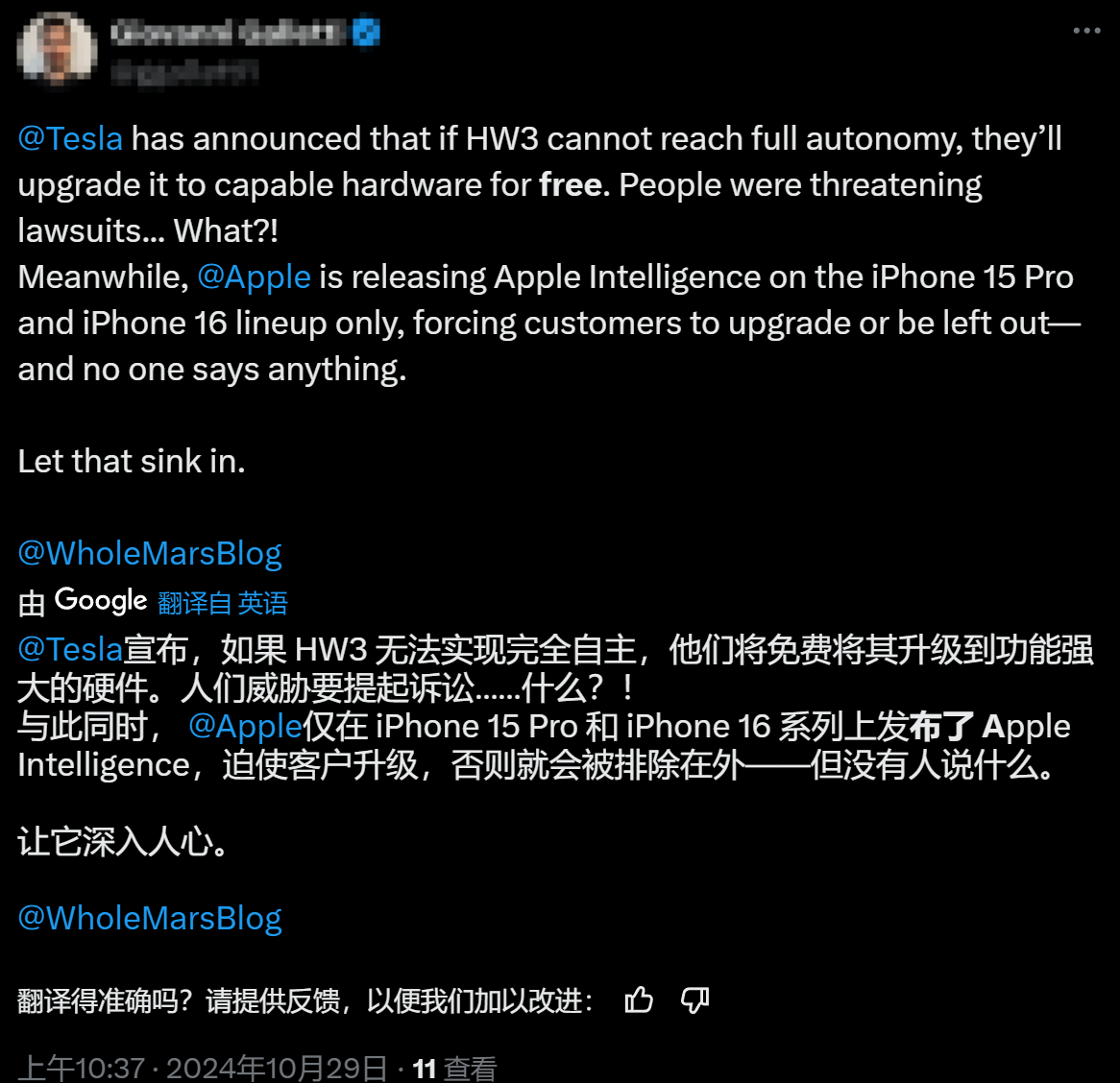
(Image source: X screenshot)
The A17 and earlier chips may lack sufficient AI computing power to run device-side large models but can handle cloud-side large models without issues. Moreover, the cloud-side large model's functionality and completeness often surpass that of the device-side model. Regarding security concerns with cloud-side large models, as long as Apple's security system is robust, the likelihood of information leakage is low.
Domestic phone manufacturers have also integrated AI into their underlying architectures. Even models equipped with the Snapdragon 8 Gen 2 or earlier chips, which may not perfectly adapt to new system features due to insufficient performance, still receive simultaneous upgrades for numerous AI capabilities. Based on cloud-side large models, I've even upgraded an older Snapdragon 888+ device with AI large models and integrated them with voice assistants in recent years.
Apple's refusal to provide AI capabilities for older models inevitably causes dissatisfaction among users of those devices. I don't believe Apple is genuinely unable to upgrade AI features for older models like the iPhone 15/15 Plus and earlier products. The core reason for Apple's refusal to offer Apple Intelligence on these devices might be to sell newer phones.
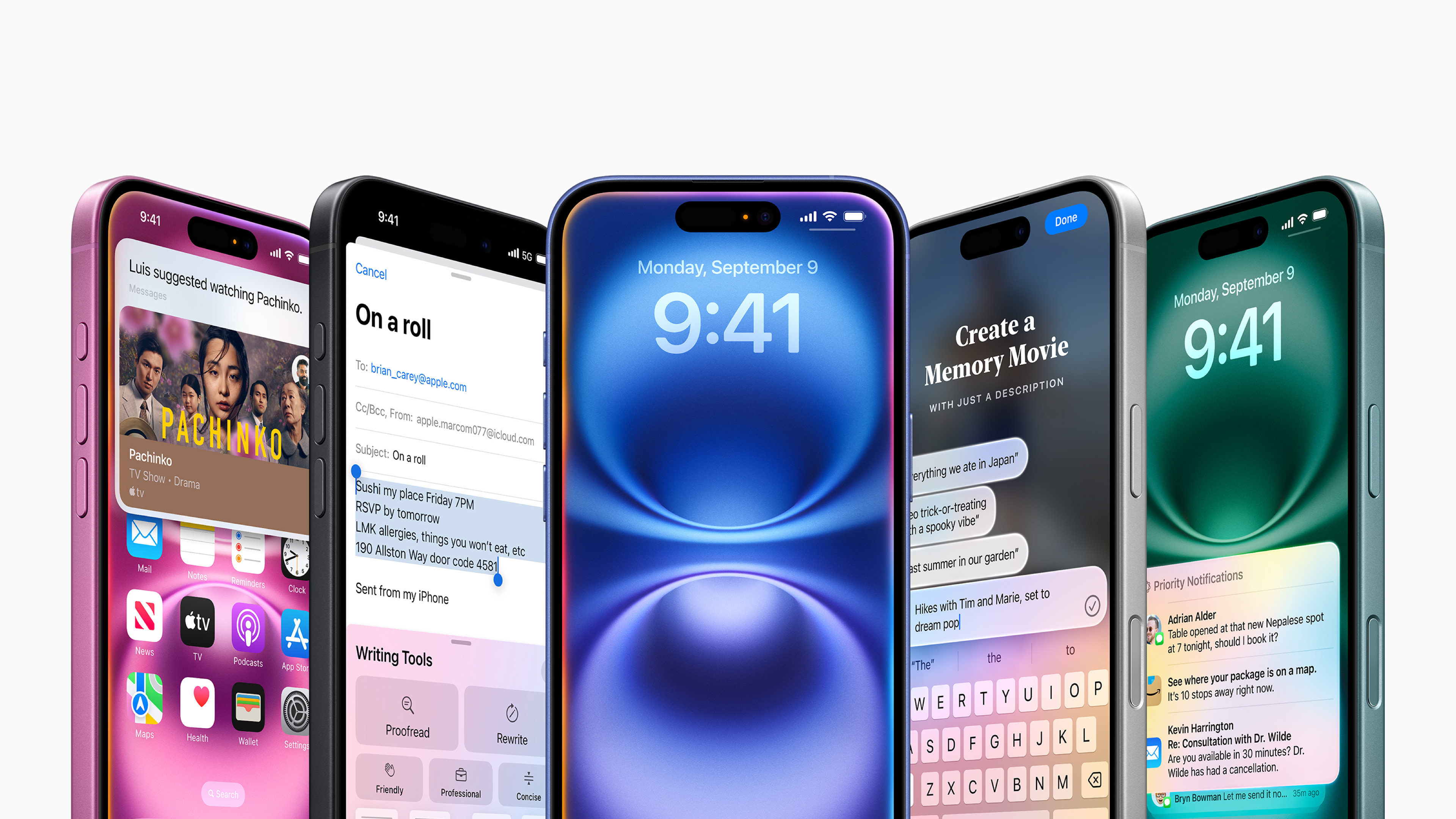
(Image source: Apple)
Listening to all sides gives clarity, while being biased leads to ignorance. To understand Apple Intelligence's reputation, I specifically visited the comment sections of related videos on YouTube, a renowned overseas video platform.
One netizen on the platform complained that they hadn't seen the potential of Apple Intelligence mentioned by the video blogger. Apple had ruined Siri, making it worse, and the writing function demonstrated could also be achieved using ChatGPT. Apple reminded them of the initial Siri launch, which was far more impressive than expected.

(Image source: YouTube)
Another netizen joked that Apple's potential was like their bank account – it might be better if they didn't check it often, as each disappointment eventually turned it into a joke.
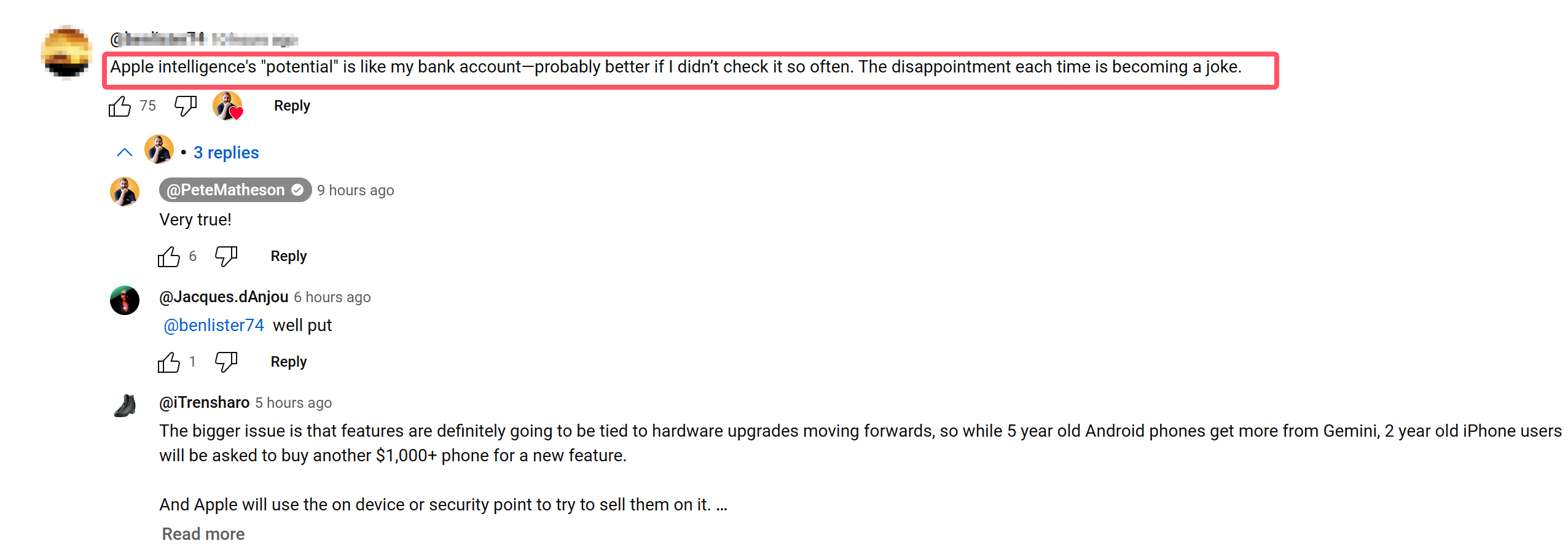
(Image source: YouTube screenshot)
Scrolling through the comments on platform X and YouTube, I hardly saw any positive reviews for Apple Intelligence. I say "hardly" because I may have missed some positive ones, not because I saw any actual praise. However, many netizens did express their eagerness for their devices to receive the Apple Intelligence update soon.
For a long time, Apple has been a leader in mobile phones, tablets, earphones, smartwatches, and other fields, with many innovative features that have been imitated by Google and Android phone manufacturers. However, in recent years, countless netizens have ridiculed Apple for copying certain designs from Android systems after each June's WWDC conference. Put politely, Android and iOS are learning from each other, but harshly speaking, iOS has transformed from being copied to becoming the copier. As for each iPhone generation's updates, they merely involve minor changes in appearance and routine hardware upgrades.
After the iPhone 16 series launch, Jia Yueting, who once worked in the mobile phone industry, stated that Apple was becoming mediocre and, without Steve Jobs, increasingly resembled a giant without a soul. While I dislike Jia Yueting, I entirely agree with this statement. We perhaps shouldn't have high expectations for Apple Intelligence, developed by an increasingly mediocre Apple.
Indecisiveness between self-development and collaboration – Apple's AI struggles are unsurprising
After a decade of investing heavily in electric vehicles, with cumulative investments reaching $10 billion, Apple ultimately abandoned its automotive business. Similarly, its foray into head-mounted displays (HMDs) with Vision Pro was also met with challenges, with reports suggesting it will cease production in November...
Apple's struggles extend beyond technology to new product development in recent years. These situations inevitably raise doubts about whether Steve Jobs' legacy is being exhausted.
Returning to AI technology, Apple faces two paths:
First, as rumored, turn Apple Intelligence into a shell application for the GPT-4o large model, providing users with a better experience at the cost of damaging Apple's image as an industry leader.
Second, persist with its in-house large model, partially sourced from OpenAI, but risk user feedback like "The experience isn't as good as ChatGPT" or "I can do these functions in ChatGPT too." Furthermore, numerous media outlets and netizens might argue that Apple has fallen behind in the AI era based on inferior AI functionality.
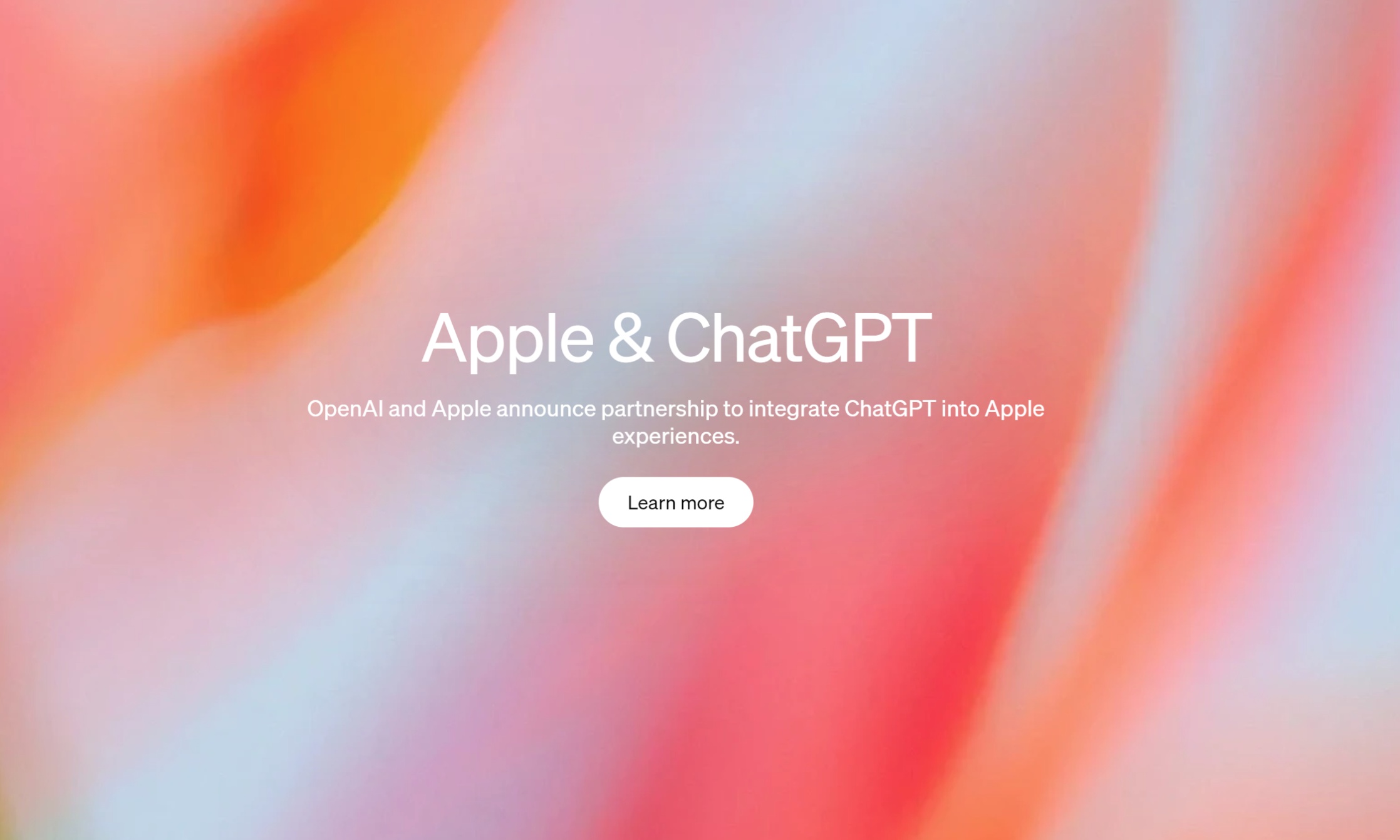
(Image source: OpenAI)
As a consumer, I naturally hope Apple takes the first path. If Apple's premium image is damaged, its product premium pricing power may weaken, which is undoubtedly beneficial for consumers. From Apple's perspective, the second path is more conducive to long-term development. Temporary lags in AI technology don't mean perpetual ones.
Moreover, according to FutureSearch statistics, OpenAI has approximately 10 million global commercial and individual customers combined. By the end of 2023, there were 167 million iPhone users in the US alone, with a global user base far exceeding that of OpenAI. Most people are accustomed to Siri's limitations and don't have high expectations for AI functionality. Considering netizens' dissatisfaction with the iPhone 15/15 Plus and older models' inability to run Apple Intelligence, "having it" is more important than "how well it works."
The first batch of user reviews was dominated by complaints because they pay close attention to digital technology and quickly upgraded after the update. Most users who aren't highly sensitive to AI functionality might not bother leaving comments online. Geeks and ordinary consumers prioritize different things, and many features geeks require may be pseudo-needs for regular users. Apple Intelligence's current AI capabilities suffice for most ordinary users' needs, and its experience will gradually improve as Apple's AI technology advances.
Can China's Apple AI turnaround through collaboration with local partners?
Finally, regarding when Apple Intelligence will launch in China, Apple plans for the Chinese version to be available in April next year, but there's still uncertainty about whether it will enter the Chinese market as scheduled. Following Tim Cook's recent visit to China and meeting with Minister of Industry and Information Technology Jin Zhuanglong, many netizens speculated that the meeting was to discuss Apple Intelligence's entry into China.
In fact, Apple has already partnered with CloudGuizhou and keeps privacy information within China. Speculation that privacy regulations prevent Apple Intelligence from entering China is unlikely to be true. The challenge for Apple Intelligence entering China might lie with the US side, as OpenAI previously stopped serving Chinese users due to relevant regulations. Since Apple Intelligence incorporates some OpenAI technology and is even questioned as a GPT-4o shell, it's normal for the US to ban it from providing AI services to Chinese users.
There have been rumors online that the Chinese version of Apple Intelligence is in partnership with Baidu and may be based on the Wenxin ERNIE Bot large model. However, there is no clear news yet, and the true situation will have to wait for further revelations. After meeting with Minister of Industry and Information Technology Jin Zhuanglong, Cook also visited Weibo's office building and said that Apple Intelligence is going through the process and believes it will be soon.
With Cook's words, it is almost certain that Apple Intelligence will enter China. Even if it is really based on Wenxin ERNIE Bot or other domestic large models, we don't need to worry about it not being user-friendly. Lei has previously reviewed multiple AI large models, and while Wenxin ERNIE Bot may not be the best among them, it is certainly the most understanding of Chinese users, more in line with our usage habits, and the experience may not be worse than the overseas version of Apple Intelligence.
Before Apple Intelligence enters China, consumers can first experience the AI functions of new flagship models from brands such as OPPO, vivo, Xiaomi, and Honor, and then choose the product that meets their expectations after comparison.
Source: Leitech





